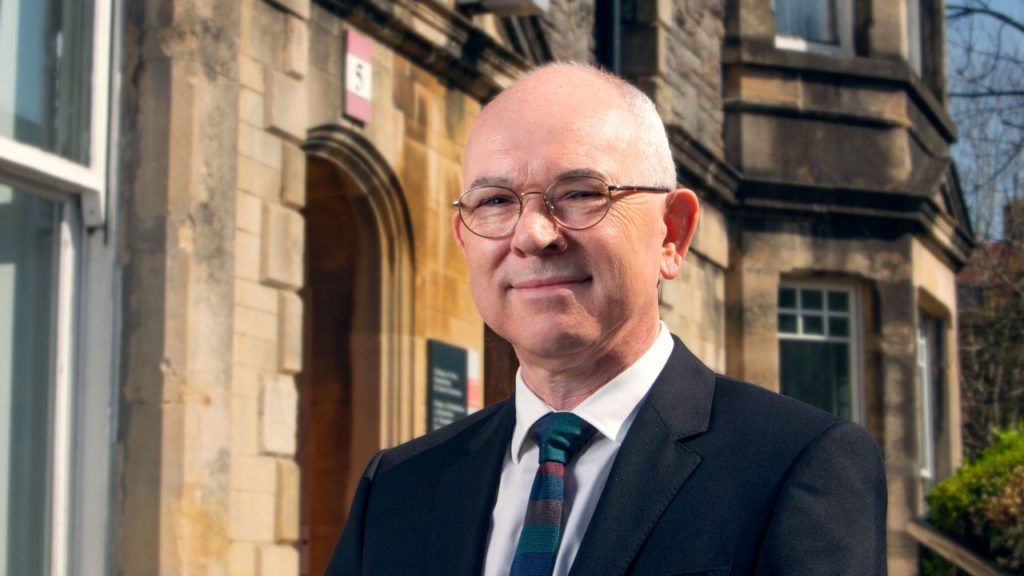
Last week I was proud to represent the University at the opening of the National Decommissioning Centre, a long-term £38m partnership between the University and the Oil & Gas Technology Centre.
Based at the University’s former Oceanlab research facility in Newburgh, the NDC will work in partnership with companies to become the global leader in research and development focused on reducing costs, extending field and asset life, and transforming the traditional approach to decommissioning.
It is fitting that the centre is based on the site of where the University has been conducting marine research since the 1950s. As a university proud of our track record in innovation, we have always been ready to evolve to meet new challenges, and decommissioning represents a challenge as well as an opportunity to create a world-class research centre that marks a continuation of the important work that has taken place there for nearly 70 years.
Our partnership with the OGTC is a great example of two organisations working towards a common goal – to support industry, both locally and nationally, and to anchor skills and talent here in the north-east. The UK Government provided the initial spark through the Aberdeen City Region Deal, and support from the Scottish Government, Scottish Funding Council and local partners has brought this ambitious project to fruition. On behalf of the University I’d like to thank all those involved for their efforts.
The University makes two distinctive contributions to a project like this. First, it brings its research expertise in basic and applied science to the technology. Secondly it brings its educational expertise to the high-level analytical, technical and managerial skills required to make best use of the scientific developments. The NDC builds on our world-renowned research and development capability, taking in all aspects of the industry from engineering and environmental issues, to economics and law. It also builds on our mission to ensure that industry benefits from our educational expertise, which demonstrated through our creation of the world’s first Masters programme in decommissioning two years ago.
The NDC’s research programme will focus on key projects where we will work with our research and industry partners to provide solutions that will support their needs. One example is the underwater laser cutting project in partnership with Proserv. The investment in a 15 kilowatt industrial laser – the most powerful of any in academia in Scotland – aims to develop an underwater cutting solution that could save industry up to £90m.
We recognise that collaboration is key to solving many of the challenges faced by the sector, and our vision for the NDC is to ensure that industry can benefit from the full range of expertise available nationally. That process is already underway, where one of our early research projects involves a collaboration with the University of Dundee on a study for plug and abandonment for the design of an isolation barrier feed, backed by £370,000 in funding from the Decommissioning Challenge Fund. We are also looking forward to appointing five postgraduate researchers to work across five research projects that aim to address challenges for the industry. These doctoral studentships will seek to provide solutions to a range of issues, from the decommissioning of pipelines and subsea bundles, to the impact on marine biology that will utilise next generation DNA technologies.
These projects will create a pool of expertise based at the NDC that will grow alongside our research capability. Through our Masters programme, and through the newly launched PhD level programme, we will create a cohort of interdisciplinary researchers that will anchor research talent here in the north-east. In addition to nurturing academic expertise to drive innovation, we will also train workers through our CPD course in decommissioning, providing a solid grounding that will help companies upskill their staff. I’m especially pleased to note that the course has recently been accredited by the Engineering and Construction Industry Training Board.
The University was founded in 1495 to undertake academic work in the service of others. By working in collaboration to build expertise at all levels – academic and within industry – we will create competitive advantage for the oil and gas industry, and for decommissioning challenges in the wider energy sector, thereby continuing to fulfil our compelling foundational purpose by strengthening the economy and reputation of Aberdeen and the North East of Scotland.
Recommended for you
